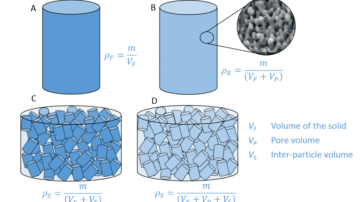Definition:
The unit weight of a soil is defined as its weight per unit volume. If weight of 10 cubic meter of soil is 20,000 kg then unit weight of that soil will be, 20,000/10=2000 kg/m3.
Followings are different types of Soil Unit Weight:
Bulk unit weight
The bulk weight or moist unit weight is the total weight W of a soil mass per unit of its total volume V.

Dry unit weight
The dry unit weight is the weight of solids per unit of its total volume (prior to drying) of the soil mass:

Unit weight of solids
The unit weight of soil solids is the weight of soil solids Wd per unit volume of solids (Vs):

Thus, when the dry weight is reckoned with reference to the total original volume V, it is called the dry unit weight and when it is reckoned with reference to the volume of solids, we get unit weight of soil solids. Since the volume Vs of the solids does not alter, unit weight of solids is a constant for a given soil, where as dry unit weight is not a constant, being dependent upon the initial volume V of the soil mass.
Saturated unit weight
When the soil mass is saturated, its bulk unit weight is called the saturated unit weight. Thus, saturated unit weight is the ratio of the total weight of a saturated soil sample to its total volume. (v)
Submerged unit weight
The submerged unit weight γ′ is the submerged weight of soil solids (Wd)sub per unit of total volume V of the soil mass:

When the soil mass is submerged, the weight of soil solids is reduced due to buoyancy. The submerged weight (Wd)sub is, therefore, equal to the weight of soil solids in air minus the weight of water displaced by solids. Hence, the submerged unit weight or the buoyant unit weight is also expressed as:

where, gw is the unit weight of water.
For calculation purposes in SI units, gw may be taken as 9.81 kN/m3.
Inter-conversion between density and unit weight
In order to convert the density (expressed in terms of g/cm3) into unit weight (kN/m3) multiply the former by 9.81. This is so because-

Hence,

In soil engineering, unit weight for a soil is a property of a soil which is used to solve the problems related to the earthwork. Unit weight is also known by the name specific weight.
Unit weight of the soil is the total weight of the soil divided by total volume. Total weight of soil also includes weight of water. Total volume occupied includes the volume of water as well as the volume of air along with the soil volume.

Leave a Reply
You must be logged in to post a comment.